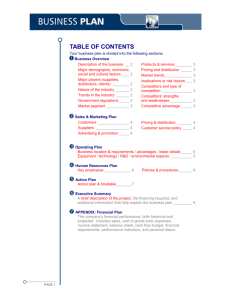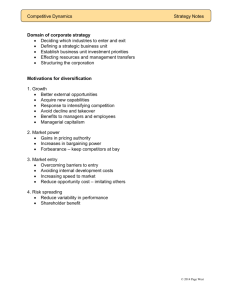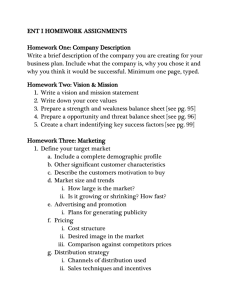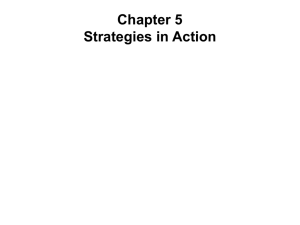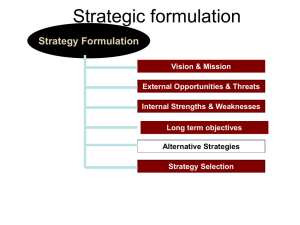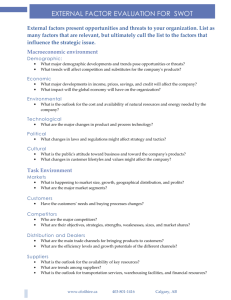Question No: 23 ( M - 1 )
advertisement
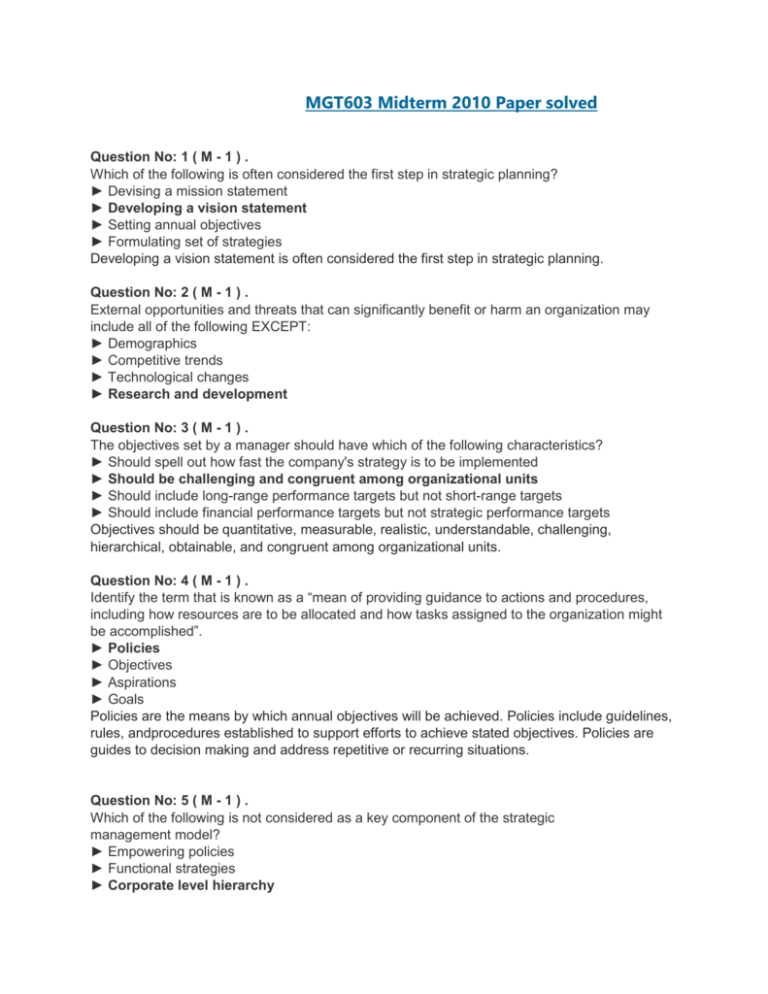
MGT603 Midterm 2010 Paper solved Question No: 1 ( M - 1 ) . Which of the following is often considered the first step in strategic planning? ► Devising a mission statement ► Developing a vision statement ► Setting annual objectives ► Formulating set of strategies Developing a vision statement is often considered the first step in strategic planning. Question No: 2 ( M - 1 ) . External opportunities and threats that can significantly benefit or harm an organization may include all of the following EXCEPT: ► Demographics ► Competitive trends ► Technological changes ► Research and development Question No: 3 ( M - 1 ) . The objectives set by a manager should have which of the following characteristics? ► Should spell out how fast the company's strategy is to be implemented ► Should be challenging and congruent among organizational units ► Should include long-range performance targets but not short-range targets ► Should include financial performance targets but not strategic performance targets Objectives should be quantitative, measurable, realistic, understandable, challenging, hierarchical, obtainable, and congruent among organizational units. Question No: 4 ( M - 1 ) . Identify the term that is known as a “mean of providing guidance to actions and procedures, including how resources are to be allocated and how tasks assigned to the organization might be accomplished”. ► Policies ► Objectives ► Aspirations ► Goals Policies are the means by which annual objectives will be achieved. Policies include guidelines, rules, andprocedures established to support efforts to achieve stated objectives. Policies are guides to decision making and address repetitive or recurring situations. Question No: 5 ( M - 1 ) . Which of the following is not considered as a key component of the strategic management model? ► Empowering policies ► Functional strategies ► Corporate level hierarchy ► Company mission Question No: 6 ( M - 1 ) . The organizations that conduct business operations across national borders are known as: ► Multinational corporations ► Domestic firms ► Strategic alliances ► Franchises Question No: 7 ( M - 1 ) . Which component of a mission statement addresses the basic beliefs, values, aspirations, and ethical priorities of the firm? ► Technology ► Philosophy ► Customers ► Self-concept Philosophy: What are the basic beliefs, values, aspirations, and ethical priorities of the firm? Question No: 8 ( M - 1 ) . “Identifying and evaluating social, political, economic, technological and competitive trends and events”; which of the followings best describes this statement? ► Developing an effective mission statement ► Conducting an internal audit ► Performing an external audit ► Formulating strategy External forces can be divided into five broad categories: Economic forces; Social, cultural, demographic, and environmental forces; Political, governmental, and legal forces; Technological forces; and Competitive forces. Question No: 9 ( M - 1 ) . External assessment is performed in which of the following strategic-management phase? ► Strategy formulation stage ► Strategy implementation stage ► Strategy evaluation stage ► All of the given options Question No: 10 ( M - 1 ) . “Ethnic balance changes due to the migration of the people from different areas to different areas. This affects the ethical behavior very much”, this is the effect of which of the following forces? ► Economic forces ► Social, cultural, and demographic forces ► Technological forces ► Competitive forces Question No: 11 ( M - 1 ) . Which of the following is TRUE about anti-trust legislation? ► The is the law intended to protect the ozone layer in the environment ► This is the law intended to regulate the tax rates in the economy ► This is the law intended to promote free competition in the market ► This is the law intended to regulate and register the patents Antitrust law: law intended to promote free competition in the market place by outlawing monopolies. Question No: 12 ( M - 1 ) . Which of the following best describes this statement; “A systematic and ethical process for gathering and analyzing information about the competition’s activities and general business trends to further a business’ own goals”? ► External assessment ► Industry analysis ► Competitive intelligence program ► Business ethics Competitive Intelligence Programs: Systematic and ethical process for gathering and analyzing information about the competition’s activities and general business trends to further a business’ own goals. Question No: 13 ( M - 1 ) . Which one of the following is NOT is a basic mission of a competitive intelligence program? ► To provide a general understanding of an industry ► To provide a general understanding of a company’s competitors ► To identify industry executives who could be hired by the firm ► To identify potential moves a competitor might make that would endanger a firm Question No: 14 ( M - 1 ) . Supplier bargaining power is not likely to pose strong competitive pressure when which of the following situation is prevailing? ► Buying firms are looking for suppliers with superior just-in-time supply capabilities and low prices ► The suppliers furnish a critical part or component that is in relatively short supply ► Buying firms collaborate closely with their key suppliers to achieve mutual benefits ► The products of alternative suppliers are highly differentiated, making the cost of switching relatively high Question No: 15 ( M - 1 ) . In Porter's Five Forces, the 'threat of new entrants' relates to which factor? ► Barriers to entry ► Substitutes ► Switching cost ► Buyer power Question No: 16 ( M - 1 ) . Internal analysis involves gathering and analyzing information about all areas of a firm EXPECT: ► Research and development ► Management information system ► Marketing ► Competitors Question No: 17 ( M - 1 ) . “A complex set of basic underlying assumptions and deeply held beliefs shared by all members of the group and drive in important ways the behavior of individuals in the organizational context” is known as: ► Internal audit ► Organizational culture ► Internal assessment ► Organizational strategy Organizational Culture - Organizational Culture is a complex set of basic underlying assumptions and deeply held beliefs shared by all members of the group that operate at a preconscious level and drive in important ways the behavior of individuals in the organizational context. Question No: 18 ( M - 1 ) . Test marketing is commonly applied by which of the following companies? ► Industrial goods companies ► Consumer goods companies ► Public sector companies ► Private sector companies Test marketing is used more frequently by consumer goods companies than by industrial goods companies. Question No: 19 ( M - 1 ) . A company's ROI (Return on Investment) can be algebraically decomposed into which of the following two major components? ► Return on sales and fixed capital ► Return on sales and net profit ► Return on sales and Cost of goods sold ► Return on sales and Total assets Question No: 20 ( M - 1 ) . All of the following fall under the category of ‘Process” function of production management EXCEPT: ► Choice of technology ► Quality assurance ► Process flow analysis ► Transportation analysis Process decisions concern the design of the physical production system. Specific decisions include choice of technology, facility layout, process flow analysis, facility location, line balancing, process control, and transportation analysis. Question No: 21 ( M - 1 ) . The IFE matrix summarizes and evaluates which factors in the functional areas of a business? ► Opportunities and threats ► Strengths and weaknesses ► Strengths and threats ► Opportunities and weaknesses A summary step in conducting an internal strategic-management audit is to construct an Internal Factor Evaluation (IFE) Matrix. This strategy-formulation tool summarizes and evaluates the major strengths and weaknesses in the functional areas of a business. Question No: 22 ( M - 1 ) . Which of these strategies is effective when the number of suppliers is small and the number of competitors is large? ► Conglomerate diversification ► Forward integration ► Backward integration ► Horizontal diversification Guidelines for Backward Integration: Number of suppliers is small and number of competitors large. Question No: 23 ( M - 1 ) . Which of the following is a drawback or limitation of Horizontal Integration? ► Synergies may be more imaginary than real ► It can increase suppliers' and buyers' bargaining power ► Economies of scale are likely to be decreased ► Both the first & third options are correct Question No: 24 ( M - 1 ) . _______________ refers to a strategy of seeking ownership or increased control over a firm’s competitors. ► Conglomerate diversification ► Backward integration ► Horizontal integration ► Concentric diversification Horizontal integration refers to a strategy of seeking ownership of or increased control over a firm's competitors. Question No: 25 ( M - 1 ) . If market shares of competitors are declining whereas total industry sales are increasing, which strategy do you think may be the right one to pursue? ► Divestiture ► Market Penetration ► Market Development ► Retrenchment Guidelines for Market Penetration: Market shares of competitors declining while total industry sales increasing. Question No: 26 ( M - 1 ) . “Substantial changes to the range of offerings or the markets served or both” is referred as: ► Differentiation ► Diversification ► Relocation ► Brand extension Substantial changes to the range of offerings or to the markets served, or both, are known as diversification. Question No: 27 ( M - 1 ) . When both divestiture and retrenchment have been pursued unsuccessfully, which of the following strategies is effective to pursue? ► Forward integration ► Liquidation ► Merger ► Takeover Guidelines for Liquidation Three guidelines when liquidation may be an especially effective strategy to pursue are: When both retrenchment and divestiture have been pursued unsuccessfully. If the only alternative is bankruptcy, liquidation is an orderly alternative. When stockholders can minimize their losses by selling the firm’s assets. Question No: 28 ( M - 1 ) . Which of the following statements is TRUE about company’s strategies? ► Company strategies concern how to grow the business, how to out-compete rivals, how to satisfy customers ► Company strategies concern when to change the company's strategic vision and business model ► Company strategies concern whether to focus on achieving short-run performance targets or on long-range ► Company strategies concern performance targets and how much organizational stretch to build in Question No: 29 ( M - 3 ) Suppose according to the IFE matrix, the weighted score of a certain company is 2.85. How that company will interpret this score? Question No: 30 ( M - 3 ) Explain concentric diversification strategy with the help of two examples of local or multinational firms operating in Pakistan? Question No: 31 ( M - 5 ) Critically analyze this statement, “Internal audit provides more opportunity for participants to understand how their jobs, departments, and divisions fit into the whole organization than the external audit”. Question No: 32 ( M - 5 ) Describe any two types of integrative strategies? Give one example for each.
